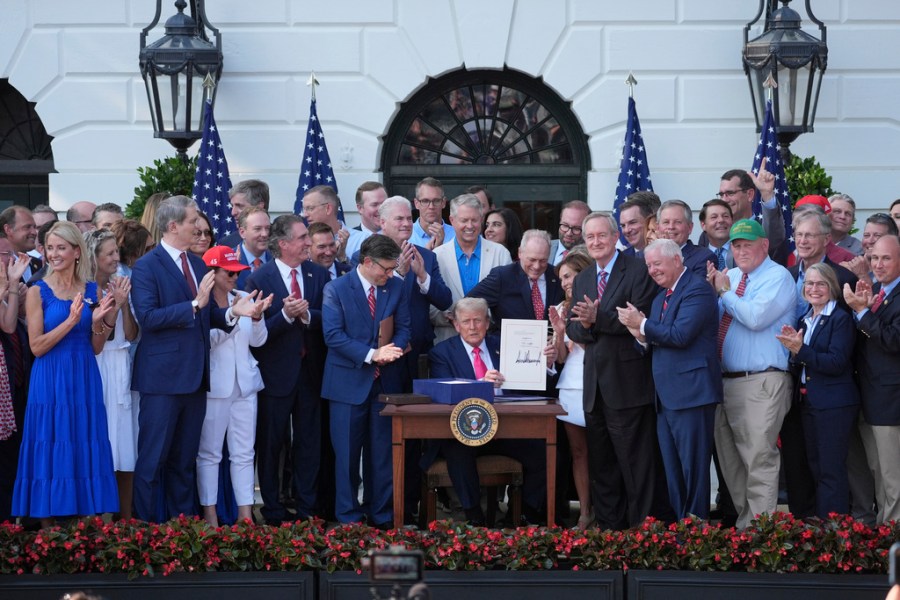For the middle class, one great, big, beautiful betrayal

Whether he actually said it or not, what Otto von Bismarck is sometimes credited with saying is true: “Laws are like sausages. It’s better not to see them being made.”
That’s certainly true of the so-called “big, beautiful bill,” passed by the House and Senate last week and signed into law by President Trump on July 4. Its enactment required breaking almost every rule governing the legislative process. And in its final form, it betrays everything the Republican Party used to stand for, to say nothing of the promises President Trump made to middle-class voters in 2024.
Both houses of Congress have rules to prevent this kind of legislation. In the normal order of business, bills must deal with one subject only; bills can be voted on only after being considered and approved by the appropriate committees; time must be allowed for members to read and study a bill before voting on it; and, in the Senate, major spending bills require 60 votes to move to the floor. Every one of those rules was broken or sidestepped to force passage of the “big, beautiful bill.”
The end result is a mammoth new law that’s a political triumph for Trump, but can only be described as a “big, beautiful betrayal” of the middle class — as even Sen. Josh Hawley (R-Mo.), who ended up voting for the bill, admitted. “We cannot be a working-class party if you are taking away health care for working-class people,” Hawley warned.
And that’s exactly what the bill does. According to the Congressional Budget Office, because of cuts to Medicaid contained in the bill, 11.8 million Americans will lose their existing health coverage and another 3.3 million Americans will lose access to food stamps under the SNAP program.
Those cuts to social programs are necessary, the White House argued, to pay for extension of the 2017 tax cuts, which had been due to expire at the end of the year. But even those tax cuts do little to help the middle class. After eight years, we know who’s benefited most from the 2017 tax cuts: the wealthiest of Americans, the same ones who will benefit most from their extension. According to the Tax Policy Center, 60 percent of the bill’s tax savings would go to the top 20 percent of households and more than one-third would go to those making $460,000 or more. Again, that’s good news for West Palm Beach, but it doesn’t do much for working families in Youngstown, Ohio.
Republicans tried to downplay their extension of tax cuts for the very wealthy by adding a provision to eliminate taxes on tips and overtime. But there’s a big difference. Under the legislation, extension of the 2017 tax cuts for the rich is permanent, but the freedom from taxes on tips expires in 2028. Nor will it help all that many people. Waiters would still have to pay state and local taxes. And, according to the Yale Budget Lab, more than one-third of wait staff don’t earn enough money to owe any federal taxes in the first place.
Included in the 940-page bill are scores of unrelated provisions — an increase in the Pentagon budget; more money for enforcement at the border; funds to renovate the Kennedy Center; a fee for citizens who sign up for a space launch with a private company; elimination of a fee on purchase of gun silencers; moving the Space Shuttle Discovery from the Smithsonian to a museum near Houston; a special tax break for whaling captains in Alaska; and $40 million to create Donald Trump’s pet project, the “Garden of American Heroes.”
All of this comes with a big price tag. The non-partisan Congressional Budget Office determined that the bill would add at least $3.4 trillion to the national debt over the next ten years. The Committee for a Responsible Federal Budget puts the total at $4 trillion or more.
One thing for sure. After passage of this bill, with GOP votes only, Republicans can no longer call themselves the party of “fiscal conservatism.” As Elon Musk said after the vote: “Every member of Congress who campaigned on reducing government spending and then immediately voted for the biggest debt increase in history should hang their head in shame.”
In addition to the very wealthy, the ones who benefit most from the “big, beautiful bill” may be the Democrats, who have been struggling to find a winning message for 2026. Now they’ve got one: Trump betrayed the middle-class Americans who voted for him. If Democrats can’t use the bill to win big in the midterms, they don’t deserve to win.
Bill Press is host of “The Bill Press Pod.” He is the author of “From the Left: A Life in the Crossfire.”